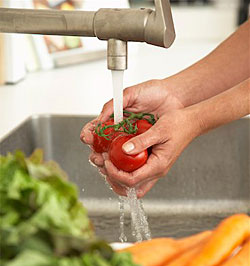 |
The authorities dealing with the recent E coli bacterial outbreak in Germany could have drawn lessons from travel medicine literature. E Coli and other bacteria like shigella, campylobacter, and salmonella are a constant source of problem for tourists and expatriates in developing countries. (The native population is also affected and suffer severe gastroenteritis, but locals probably require a more sizeable dose of the organism to fall prey.)
Halogen compounds like iodine and chlorine tablets are useful companions of tourists in the developing world. In Germany, even as the hunt was on to find the source of the E coli outbreak, an effective means to deal with the problem would have been to tell the German public at large to soak all salad for at least 20 minutes in iodine or chlorine solution. This procedure would have killed the E coli and inhibited the outbreak.
In Nepal we tell people who wish to eat salads to buy a small bottle of 5 % Lugol's iodine (locally available) and to put 6 to 8 drops of this in 1 l of water and soak the raw vegetables in this solution with a bit of stirring and allow it to remain in contact for 20 minutes to kill the pathogens (except probably cyclospora, a seasonal cause of diarrhea in expatriates). Chlorine tablets can also be used, but potash (potassium permanganate) is not effective and causes teeth staining. Washing the salad with just bottled or boiled water is unhelpful because a germicidal activity is necessary.
An important point on water purification (which is unrelated to cleaning salad) is that all pathogens are killed as soon as the water starts boiling. For good measure you can let the water boil for one minute, but there is absolutely no need to boil the water for 10 or more minutes even at high altitude where the barometric pressure is lower and water boils more promptly.
Finally, a sobering thought: there must be many infectious disease outbreaks we never hear of in countries like Nepal because of lack of surveillance and detection. The Health Ministry and related INGOs need to strive for better documentation so that effective plans can be made. But for now Germany can certainly use a page from available travel medicine literature.


